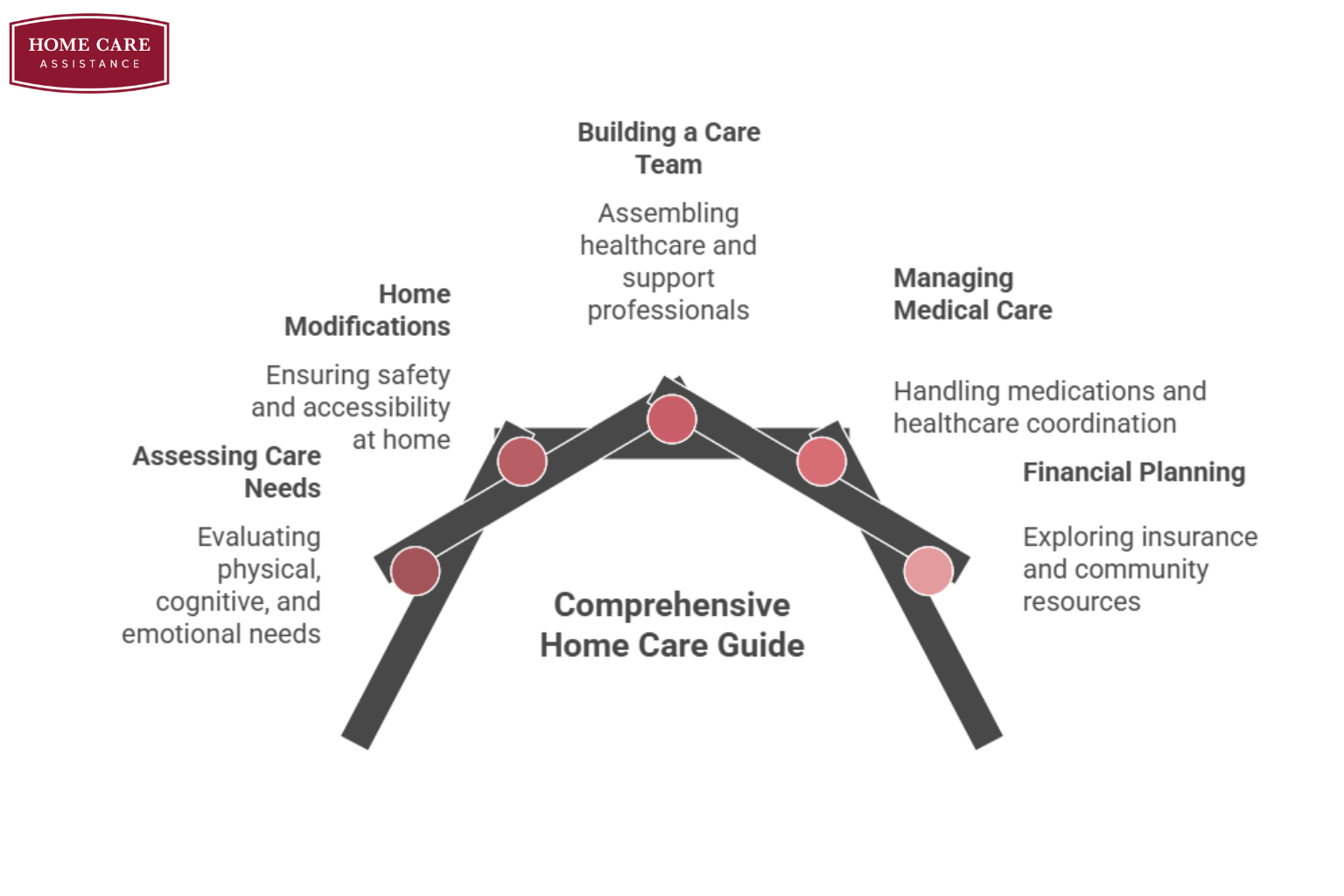
Table of Content
Caring for a senior loved one with a disability at home requires careful planning, specialized knowledge, and access to appropriate resources. Understanding the key components of effective home care can make a significant difference in quality of life for both seniors and their families. This guide covers the essential aspects you need to know about providing safe, comfortable, and dignified care at home.
Assessing Care Needs and Creating a Plan
Before beginning home care, conduct a thorough assessment of your loved one’s physical, cognitive, and emotional needs. This evaluation should include:
- Medical conditions and mobility limitations – Document all diagnoses, medications, and physical challenges.
- Daily living activities – Assess abilities in bathing, dressing, eating, and toileting.
- Safety concerns – Identify fall risks, medication organization issues, and emergency response needs.
- Social and emotional wellbeing – Consider isolation risks and mental health support requirements.
Work with healthcare professionals to develop a comprehensive care plan that addresses these areas. Regular reassessments ensure the plan evolves with changing needs and prevents unnecessary complications or hospitalizations.
There are a variety of age-related health conditions that can make it more challenging for seniors to live independently. However, many of the challenges they face can be easier to address if their families opt for professional senior home care. You can rely on expertly trained caregivers to keep your loved one safe and comfortable while aging in place.
Home Modifications for Safety and Accessibility
Creating a safe environment is crucial for seniors with disabilities. Key modifications include:
Bathroom safety
- Install grab bars near toilets and in showers.
- Add nonslip mats and raised toilet seats.
- Consider walk-in tubs or roll-in showers for wheelchair users.
Mobility improvements
- Install ramps or stairlifts for multilevel homes.
- Widen doorways to accommodate wheelchairs or walkers.
- Remove tripping hazards like loose rugs and electrical cords.
General safety features
- Improve lighting throughout the home, especially in hallways and stairs.
- Install easy-to-reach light switches and lever-style door handles.
- Add emergency alert systems or medical alarm devices.
Many modifications qualify for funding through insurance, veterans’ benefits, or local assistance programs, making them more affordable for families.
Building Your Care Team
Successful home care often requires a team approach combining family caregivers with professional support. Consider these team members:
Healthcare professionals
- Home health nurses for medical care and monitoring
- Physical or occupational therapists for mobility and daily living skills
- Social workers for care coordination and resource connections
Daily support services
- Certified home caregivers for personal care assistance
- Companions for social interaction and light housekeeping
- Meal delivery services or nutritional support
Establish clear communication channels among team members to ensure coordinated care. Regular team meetings can help them identify issues early and adjust care plans as needed.
Richmond at-home care experts are available to provide high-quality care to seniors on an as-needed basis. From assistance with mobility and exercise to providing transportation to the doctor’s office and social events, there are a variety of ways professional caregivers can help your aging loved one continue to live independently.
Managing Medical Care and Medications
Seniors with disabilities often have complex medical needs requiring careful management:
Medication safety
- Use pill organizers or automated dispensing systems.
- Maintain updated medication lists and share with all providers.
- Watch for side effects and drug interactions.
- Ensure easy access to emergency medications.
Healthcare coordination
- Schedule regular checkups and specialty appointments.
- Maintain organized medical records and insurance information.
- Prepare for medical emergencies with action plans.
- Consider telemedicine options for routine consultations.
Keep emergency contact information easily accessible and ensure all caregivers understand emergency procedures specific to your loved one’s conditions.
Financial Planning and Available Resources
Home care costs can be substantial, but various resources may offset expenses:
Insurance coverage
- Medicare covers some home health services when medically necessary.
- Medicaid may provide more comprehensive coverage for eligible individuals.
- Long-term care insurance policies often include home care benefits.
- Veterans may qualify for Aid and Attendance benefits.
Community resources
- Area Agencies on Aging offer information and assistance programs.
- Local disability organizations provide support and advocacy.
- Religious and community groups often offer volunteer services.
- State programs may provide respite care or equipment assistance.
Research available resources early, as application processes can take time. Many families benefit from consulting with elder law attorneys or care managers who specialize in navigating these systems and maximizing available benefits.
Whether you need respite from your caregiving duties or your aging loved one needs live-in care, Home Care Assistance Richmond can meet your family’s care needs. Our dedicated caregivers are available around the clock to provide transportation to doctor’s appointments, ensure seniors take their prescribed medications, and help with a variety of tasks in and outside the home. Schedule a free in-home consultation by giving us a call today at (804) 207-4746.
